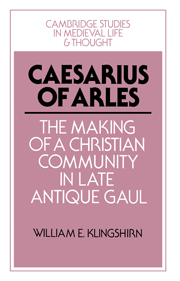Book contents
- Frontmatter
- Contents
- List of maps
- Acknowledgments
- List of abbreviations
- Concordance of Caesarius's Letters
- Map 1 The diocese of Aries and environs (c. 500)
- Map 2 The city and suburbs of Aries (c. 530)
- Introduction
- 1 In search of the vita perfecta
- 2 Late Roman Aries
- 3 The making of a reformer
- 4 Visigothic Arles and its bishop
- 5 The Ostrogothic peace
- 6 Christian rhetoric and ritual action
- 7 Christianity as a community religion
- 8 The limits of christianization
- 9 The coming of the Franks
- 10 The legacy of Caesarius
- Select bibliography
- Index
- Cambridge Studies in Medieval Life and Thought Fourth series
6 - Christian rhetoric and ritual action
Published online by Cambridge University Press: 02 December 2009
- Frontmatter
- Contents
- List of maps
- Acknowledgments
- List of abbreviations
- Concordance of Caesarius's Letters
- Map 1 The diocese of Aries and environs (c. 500)
- Map 2 The city and suburbs of Aries (c. 530)
- Introduction
- 1 In search of the vita perfecta
- 2 Late Roman Aries
- 3 The making of a reformer
- 4 Visigothic Arles and its bishop
- 5 The Ostrogothic peace
- 6 Christian rhetoric and ritual action
- 7 Christianity as a community religion
- 8 The limits of christianization
- 9 The coming of the Franks
- 10 The legacy of Caesarius
- Select bibliography
- Index
- Cambridge Studies in Medieval Life and Thought Fourth series
Summary
As they entered the Christian episcopate in increasingly large numbers over the course of the fifth and sixth centuries, Gallic aristocrats found it possible to redefine their local authority and prestige in a new ideology largely of their own making. Toward the end of the fifth century, however, reformers such as Pomerius and the author of the statuta ecclesiae antiqua challenged the increasingly aristocratic character of this redefinition, arguing that episcopal authority should be based more on the bishop's exemplary faith and ascetic way of life than on his birth, wealth, or superior education. How closely Caesarius abided by these reform ideas can best be seen in the displays of word and action by which he attempted to establish his own authority as bishop and to mobilize that authority for the inculcation of Christian values. Because Caesarius himself thought it most important, we begin this chapter with his authority as a preacher, and then proceed to consider the equally potent non-verbal sources of his authority: his performance of church ritual and his reputation as a holy man, which led to a belief in his miraculous powers.
THE ART OF PREACHING
At the heart of Caesarius's work as a pastor lay the conviction that the bishop's primary responsibility was to instill in his people the values, beliefs, and practices that would ensure for them a place in the kingdom of God (serm. 4.4; 230.5). Living in a culture in which the spoken word still carried great authority, and disposed by his social class and education to trust the power of rhetoric, Caesarius simply took itfor granted that preaching provided the most effective means of accomplishing his pastoral objectives.
- Type
- Chapter
- Information
- Caesarius of ArlesThe Making of a Christian Community in Late Antique Gaul, pp. 146 - 170Publisher: Cambridge University PressPrint publication year: 1993



